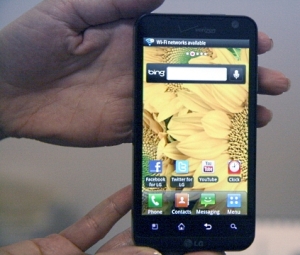O2: 4G mobile broadband will allow data 'toll roads'

O2 intends to use long-term evolution — the 4G mobile technology expected to hit the UK in a few years — as an opportunity to charge content providers for giving their web services priority over other data, the operator has said.
When long-term evolution (LTE) arrives, it will offer mobile broadband speeds above 50Mbps, as opposed to today's 3G-based maximum of 14Mbps. This will make it possible to create a two-speed mobile internet without degrading the speeds or quality of services running on the lower tier, O2's UK managing director Ronan Dunne said on Tuesday.

O2 intends to use LTE as a "toll road" for content providers that deliver 4G services to phones like the LG Revolution. Photo credit: Nicole Lee/CNET News
He said O2 is investigating various business models that involve working with content providers, but added that none of models will adversely affect the end user.
"We will never degrade a particular service because of which model is being used," Dunne told ZDNet UK. "What we will do is use the example of LTE to provide an equivalent of the M6 toll road, [so content providers can] choose that particular channel to put the most media-rich content through. It's using the network efficiently with a view to optimising the experience for the end user."
Sender-pays data
To the ire of net-neutrality advocates, fixed and mobile operators have repeatedly floated the idea of charging content providers for the privilege of having their services — the BBC's iPlayer and YouTube are frequently-cited examples — run at decent qualities over the operators' networks. Dunne himself said at a Westminster eForum in November that these charges would give content providers an incentive to make their network use more efficient.
However, the idea has not yet taken off, beyond a few tangentially-related instances of companies introducing of 'sender-pays data'. One example of this is the bus firm Arriva, which makes payments to operators for mobile tickets to be delivered to customers, who bear no cost.
The idea has languished partly because no major content provider has agreed to pay operators for prioritisation — at least in public — and partly because prioritisation itself implies the degradation of services that are not subject to such arrangements.
Dunne said LTE will solve the prioritisation problem for the mobile industry, as degradation can be avoided when capacity exceeds supply. "At the moment, we couldn't do it," he said. LTE services will not be rolled out in the UK until 2014 at the earliest.
"In the short term, it's not a practical option, but with new spectrum there is the potential to provide [tiered] bandwidth," he added. "It's not about trying to degrade [other services]."
"Simple principles"
Dunne spoke to ZDNet UK shortly after taking to the stage at a Westminster eForum on smartphones and tablets. Also speaking was Ofcom competition law chief David Stewart, who said "simple principles" will have to be obeyed if operators are to start taking payments from content providers for priority.
"[Operators would] need to make it clear that they're engaging in particular traffic management policies," Stewart said. "There is no way of speeding up packets through a network; you slow others down. We have been rescued by Moore's Law again and again from having to deal with this."
Stewart said competition law could be used to control such arrangements, but the regulator would hold back from introducing new rules until a demonstrable problem arose.
Andrew Bud, co-founder of mBlox, spoke at the eForum about the mobile billing company's products, which are designed to help operators manage their tiered pricing. Asked whether charging content providers for prioritised services would put cash-strapped start-ups at a disadvantage when competing with deep-pocketed rivals such as YouTube, he said the problem could be avoided.
"[Operators] could quite happily give away discount data to content providers, saying: 'The first terabyte you send through our network per month is free'," Bud said. "This would address the relatively small population of content providers [that] make massive use of the network."
Get the latest technology news and analysis, blogs and reviews delivered directly to your inbox with ZDNet UK's newsletters.